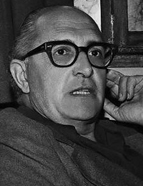

Although Jorge de Sena did not have an academic background in history, a historical dimension is clearly perceptible in his literary and critical work, thus making it worthy of a historiographical analysis. Indeed, his life is relevant per se for an in-depth understanding of contemporary Portuguese culture and of the history of the opposition to the Estado Novo. His writings alone may be said to feature elements, ideas and concepts which are pivotal for aglobal overview of Portuguese cultural production in clearly defined historical moments. Sena wrote abundant prose on the most varied themes and authors, ranging from Luso-Brazilian history, culture, and literature to English and American literature. His work encompasses conferences, articles, papers, literature reviews and mere encyclopaedia or dictionary entries. Also noteworthy were his compilations of correspondence with major Portuguese intellectual figures and the volumes of essays published late in his life (or organised posthumously by his wife Mécia de Sena). One of such volumes, Estudos de História e de Cultura [Studies on History and Culture], which was mainly composed of essays published by issue from 1963 onwards in the journal Ocidente [West] and later compiled in a volume in 1967, may be regarded as an interdisciplinary work that encounters a vehicle in history to attain something altogether more far-reaching and closer to the author’s interests, namely the multiple nuances of Portuguese culture. Some documents worthy of mention are the genealogical study “A família de Afonso Henriques” [The family of Afonso Henriques], the study “O vitorianismo de dona Filipa de Lancaster” [Victorian traits of Phillipa of Lancaster”], the article “Os painéis ditos de ‘Nuno Gonçalves’” [The so-called ‘Nuno Gonçalves’ Panels], in which he examines 16th-century Iberism and the reams of critical texts prompted by those panels and, perhaps the most important text, “Inês de Castro ou literatura portuguesa de Fernão Lopes a Camões, com uma análise estrutural da Castro de Ferreira, um longo estudo com várias abordagens e aspectos [...] [Inês de Castro or Portuguese Literature from Fernão Lopes to Camões, with a structural analysis of Castro by [António] Ferreira, an in-depth study with different approaches and features]”.
It could hardly be said that the essays in this book are the product of a purely historian mind, since the reader encounters a mind for whom culture was “free discussion and enlightenment, and the personal conquest of freedom of thought and of speech” (O Essencial Sobre... [The Basics of…], p. 30).
